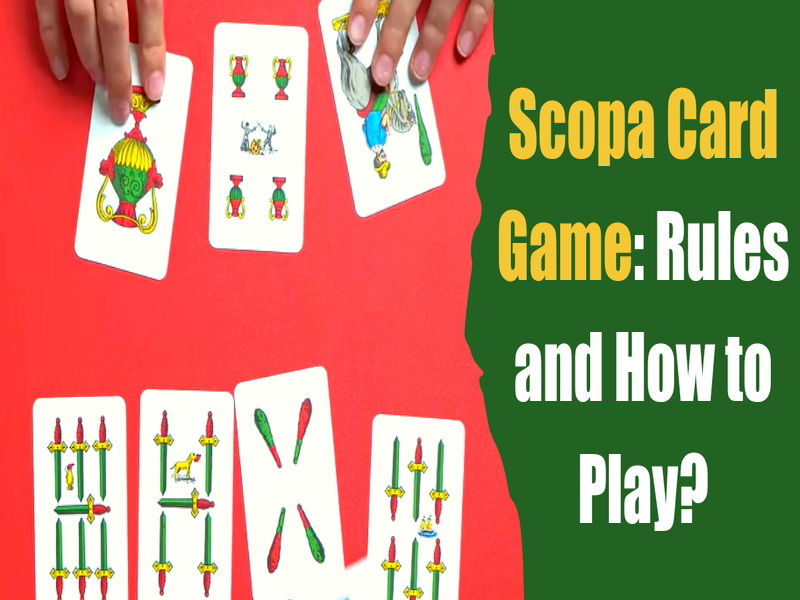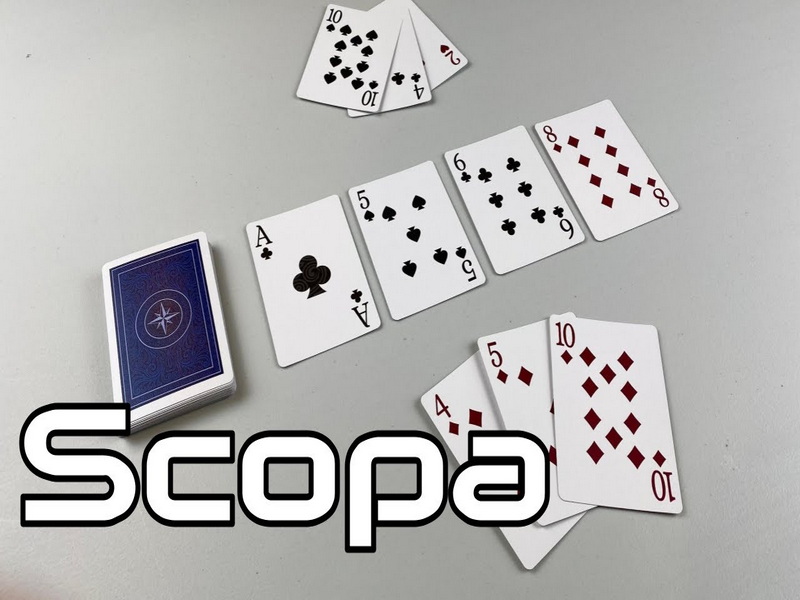Content Menu
● Introduction
● Overview of Scopa
● Setting Up the Game
>> Number of Players
>> The Deck
>> Dealing the Cards
● Basic Rules of Scopa
>> Objective
>> Taking Turns
>> Capturing Cards
>> Scopas
>> Drawing Cards
● Scoring Points
● Strategies for Winning at Scopa
>> Know Your Cards
>> Capture Wisely
>> Aim for Scopas
>> Team Play Dynamics
>> Adaptability
● Variations of Scopa
● Cultural Significance
● Conclusion
● Frequently Asked Questions (FAQs)
>> 1. What are the basic rules of Scopa?
>> 2. How do I score points in Scopa?
>> 3. Can I play Scopa with a regular deck of playing cards?
>> 4. How many players can participate in Scopa?
>> 5. What is a scopa?
Introduction
Scopa is a traditional Italian card game that has been enjoyed for centuries. The game is not only popular in Italy but has also gained a following in various parts of the world. Scopa is a game of skill, strategy, and a bit of luck, making it an engaging pastime for players of all ages. In this article, we will explore the rules, strategies, and nuances of Scopa, providing you with everything you need to know to play and enjoy this classic card game.

Overview of Scopa
Scopa is typically played with a deck of Italian cards, which consists of 40 cards divided into four suits: cups, swords, coins, and clubs. Each suit contains cards numbered from 1 to 7 and three face cards: the Jack (Fante), Knight (Cavallo), and King (Re). The objective of the game is to score points by capturing cards from the table and achieving specific goals.
Setting Up the Game
Number of Players
Scopa can be played by two to six players. The most common variations are two-player or four-player games, where players can form teams. In team play, communication and strategy become even more critical as you work together to outsmart your opponents.
The Deck
As mentioned earlier, Scopa uses a 40-card Italian deck. If you do not have an Italian deck, you can use a standard deck of playing cards by removing the 8s, 9s, and 10s. It's essential to ensure that all players understand which deck will be used before starting the game.
Dealing the Cards
To begin the game, each player is dealt three cards. After dealing, four cards are placed face-up on the table. The remaining cards form a draw pile. If you are playing with four players in teams, partners sit opposite each other.
Basic Rules of Scopa
Objective
The main objective in Scopa is to score points by capturing cards from the table. Players aim to achieve specific goals that yield points at the end of each round. The game continues until a predetermined score is reached or for a set number of rounds.
Taking Turns
Players take turns in a clockwise direction. On your turn, you can either capture one or more cards from the table or play a card that matches one on the table. If you cannot make a valid move by capturing cards, you must play one card from your hand onto the table.
Capturing Cards
To capture cards from the table:
- You must play a card from your hand that matches the value of one or more cards on the table.
- If you cannot match any card on the table, you can play any card.
- You can also capture multiple cards if their total value equals the value of your played card.
For example, if there is a 2 and a 3 on the table and you play a 5 from your hand, you can capture both cards. This aspect of gameplay encourages strategic thinking as players must assess not only their own hands but also anticipate their opponents' moves.
Scopas
If you manage to capture all the cards from the table in one turn, it is called a "scopa." This achievement earns you an extra point at the end of that round. A scopa can significantly impact your overall score and should be aimed for whenever possible.
Drawing Cards
After each player has taken their turn, they draw new cards from the draw pile until each player has three cards again. If there are no more cards left in the draw pile, players continue playing with their remaining cards. This mechanic adds an element of strategy regarding when to play certain cards based on what might still be available in future turns.
Scoring Points
At the end of each round, players tally their points based on various criteria:
- Cards Captured: Each card captured is worth one point.
- Scopas: Each scopa earns an additional point.
- Settebello: The player who captures the 7 of cups earns an extra point.
- Primiera: This is awarded for having the best combination of high-value cards across all suits. The player with the highest total value in their captured cards scores an additional point.
The Primiera scoring can lead to interesting dynamics as players may aim to capture specific high-value cards throughout gameplay rather than just focusing on immediate captures.

Strategies for Winning at Scopa
Know Your Cards
Understanding which cards have been played can give you an advantage. Keep track of what your opponents are capturing and adjust your strategy accordingly. This awareness allows players to make informed decisions about whether to capture certain cards or leave them for later turns.
Capture Wisely
When capturing cards, consider not just immediate gains but also how your actions affect future plays. Sometimes it may be beneficial to leave certain cards on the table for strategic reasons. For instance, if you know your opponent needs a particular card to complete a set or achieve a scopa, it might be wise to avoid capturing it yourself.
Aim for Scopas
Always be on the lookout for opportunities to achieve scopas. Capturing all available cards can significantly boost your score. Additionally, achieving multiple scopas throughout a game can create momentum that may lead to victory.
Team Play Dynamics
In team games, communication with your partner is crucial. Develop strategies together while maintaining subtlety so that opposing teams do not catch on to your plans. Discussing potential moves without revealing too much information can help coordinate efforts effectively.
Adaptability
Being flexible in your strategy is vital as gameplay progresses. As players capture different combinations of cards and new ones come into play from draws, being able to adapt will keep you competitive throughout rounds.
Variations of Scopa
While traditional Scopa follows specific rules, various regional variations exist that introduce different scoring systems or gameplay mechanics. Some popular variations include:
- Scopone: Played with four players in teams of two where more complex scoring rules apply.
- Scopone Scientifico: A more complex version where players must keep track of points more rigorously; teams often strategize around specific goals.
- Scopone d'Assi: In this variant, players score additional points for capturing aces; this adds another layer of strategy regarding which suits to prioritize during gameplay.
- Scopone con la Chiamata: In this version, players announce their intentions before playing certain high-value cards; this creates anticipation and strategic depth as opponents must respond accordingly.
These variations keep Scopa fresh and engaging for seasoned players while also offering new challenges and experiences.
Cultural Significance
Scopa holds cultural significance in Italy beyond just being a recreational activity; it often serves as a social bonding experience among family and friends during gatherings or holidays. Many Italians have fond memories associated with playing Scopa at family events or community festivals.
The game's simplicity allows it to be accessible while still offering depth for those who wish to master its strategies over time. As such, it remains an integral part of Italian culture and continues to be passed down through generations.
Conclusion
Scopa is an enjoyable and strategic card game that combines skill with social interaction. Whether playing casually with friends or competitively in tournaments, understanding its rules and strategies can enhance your experience. With practice and familiarity with its nuances, you will find yourself enjoying this timeless classic even more.

Frequently Asked Questions (FAQs)
1. What are the basic rules of Scopa?
The basic rules involve dealing three cards to each player and placing four face-up on the table. Players take turns capturing matching cards or playing any card if they cannot match. Points are scored based on captured cards and special achievements like scopas.
2. How do I score points in Scopa?
Points are scored by capturing cards (one point each), achieving scopas (one additional point), capturing the 7 of cups (settebello), and having the best combination of high-value cards (primiera).
3. Can I play Scopa with a regular deck of playing cards?
Yes! You can play Scopa using a standard deck by removing all 8s, 9s, and 10s.
4. How many players can participate in Scopa?
Scopa can be played by two to six players. It's commonly played in pairs or as singles depending on how many participants there are.
5. What is a scopa?
A scopa occurs when a player captures all available cards from the table in one turn. Achieving this grants an extra point at the end of that round.































